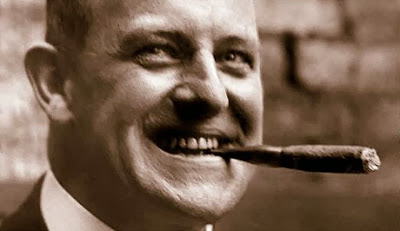P G Wodehouse - prose of sunlight
Wodehouse
(Pelham Grenville, or Plum to his friends) is
the quintessential English humourist writer.
A self admitted author of ‘light
writing’, Wodehouse novels are like a spring breeze that invigorates and
soothes the soul. As put by Stephen Fry, who played the TV version of Jeeves in
the famous and definitive adaptation with his pal Hugh Laurie (Dr House), ‘You don’t
analyse such sun-lit perfection. You just bask in its warmth and splendour.’
 |
| Jeeves and Wooster as played by Hugh Laurie and Stephen Fry |
Unlike
most humourists such as the Amises and Tom Sharpe, Wodehouse refused to use two of the greatest weapons in a
humourists arsenal – sex and death. It’s like asking me to write without using
the letter ‘e’. Which would b a suicidal mov and a complt wast of tim…(Actually
the French novel La disparition by Georges Perec notably contains no ‘e’ in the
approved oulipo style of constrained writing).
Despite this, Wodehouse still
manages to rise to the apex of humour literature with his unequalled mastery of
prose. Many modern writers bow warmly to his gift including Evelyn Waugh,
Christopher Hitchens and Douglas Adams.
Hitchens wrote a great essay on McCrum's biography of Wodehouse in the Atlantic:
Hitchens wrote a great essay on McCrum's biography of Wodehouse in the Atlantic:
Having
lived to the venerable age of 93 and living through the horrors of two world
wars, Wodehouse’s writing remained entrenched in the golden era of English innocence,
which can partly explain the appeal of his novels.
His stories are set in an England where chivalry was high, a gentleman's word was his bond, and the feudal spirit lived on. He exuded a school-boyish
tendency to be apolitical and naïve beyond belief.
During Nazi Germany’s
lightning assault across Belgium
and France in 1940,
Wodehouse, who remained living on the French coast instead of returning to England out of
apparent unawareness of the seriousness of the situation, was taken prisoner.
When he was interned at Upper Silesia, he remarked “If this is Upper
Silesia, one wonders what Lower Silesia must
be like…” The Nazi propagandists decided to use his fame as an author and
playwright and asked him to give some ‘non-political’, humorous radio
broadcasts. One of the opening paragraphs of his first broadcast contained the
fantastic lines:
‘Young
men, starting out in life, have often asked me, “How can I become an Internee?”
Well, there are several methods. My own was to buy a villa in Le Touquet on the
coast of France
and stay there till the Germans came along. This is probably the best and
simplest system. You buy the villa and the Germans do the rest.’
However,
despite this brilliant dig that somehow got through the gauntlet of the German
editorial censor, upon his release and return to England, he was branded a
traitor and was savaged by the press and many authors, although Evelyn Waugh
and George Orwell wrote in his defence. The heavy criticisms finally persuaded
Wodehouse, the archetypal English man, to move to New York with his America-born wife.
For more on that episode, read Orwell's essay in defense of Wodehouse:
Continued
to write stories set chiefly in English estates, Wodehouse was the creator of
Jeeves and Wooster , Psmith, Blandings Castle
‘I
once got engaged to his daughter Honoria, a ghastly dynamic exhibit who reads
Nietzsche and had a laugh like waves breaking on a stern and rockbound coast’
‘His
face looked pretty much like an explosion in a tomato cannery on a sunset
evening.’
Bertie
Wooster, who can tell when Jeeves is displeased, remarked ‘I could see that, if
not actually disgruntled, he was far from being gruntled.’
‘He
looked like a sheep with a secret sorrow.’
‘There’s
no getting away from the fact that, if ever a man required watching, it’s
Steggles. Machiavelli could have taken his correspondence course.’
The
fundamental gist of all Wodehouse stories seem to run along the lines of:
terrible calamity ensued due to unfortunate incidents, misunderstandings and
unforseen circumstance which drops the hero or heroine into the abyss of
despair, only to be solved by the end of the story via hilarious happenings and
everyone lives happily ever after.
My favourite hero under his pen, and indeed,
one of my favourite in literature, is Bertie Wooster, the idiot with the heart
of gold, who invariably gets into strife trying to help his friends only to
have his omnipotent valet Jeeves save the day with a particularly cunning plan.
All but one of the Jeeves and Wooster stories are told by Bertie in the first person. The humour is accentuated by the fact that despite Bertie being as thick as a whale omlette, he narrates the story in the most engaging and ingeneous fashion; itself a grand joke.
In The Code of the Woosters, the eponymous code turns out to be ‘never let a
pal down’, a code, despite many a set back and often against his better judgements, Bertie sticks to. Jeeves and Wooster remains one of the imperishable literary duos in history along side Holmes and Watson and Tom Sawyer and Huck Finn.
 |
| The well meaning Bertie, described by Jeeves as 'perhaps mentally somewhat negligible but he has a heart of gold'. |
A
fan of mysteries, Wodehouse dedicated a book to Edgar Wallace whilst Agatha
Christie dedicated her Hallowe’en Party to Wodehouse “To P G Wodehouse – whose
books and stories have brightened my life for many years. Also, to show my
pleasure in his having been kind enough to tell me he enjoyed my books.” A wonderful tribute paid by one writer to another.
To
read Wodehouse is to escape into a world of eternal spring and joy.




Comments
Post a Comment